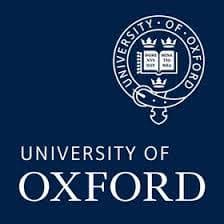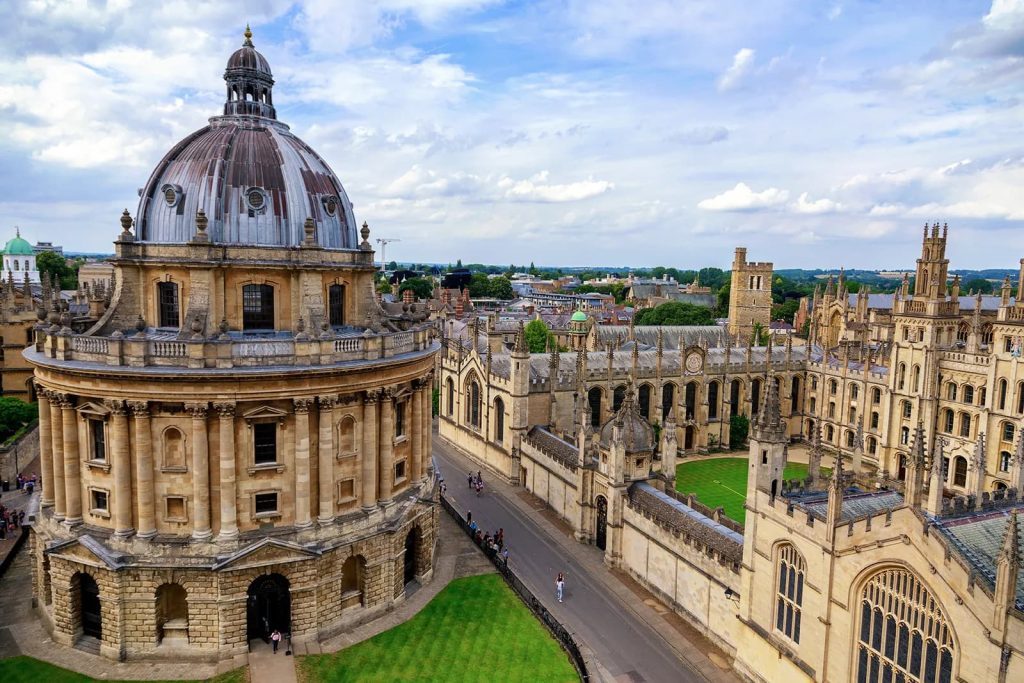Renowned for its rich history, academic excellence, and global impact, University of Oxford is nestled in the heart of a historic and vibrant city. This center of learning has consistently pushed the boundaries of knowledge generation. For centuries, it’s been a center where people learn a lot and share their knowledge. People across the globe come here to learn and grow, making it a place that lights up with new ideas and ways of thinking. But what really makes it stand out? Is it the academic excellence, the Hogwarts-like colleges, or the sheer prestige of saying, “I studied at Oxford”? Let’s break it all down and see if Oxford is truly worth the buzz!
About the University of Oxford
| Particulars | Details |
| Also Known as | The City of Dreaming Spires |
| Year of Establishment | 1096 |
| Address | Wellington Square, Oxford, UK |
| Website | https://www.ox.ac.uk/ |
| International students website | https://www.ox.ac.uk/students/new/international |
| Intakes | Michaelmas Term (October Intake) |
| Acceptance rate | 17% |
| Endowments value | £8.066 billion |
| Email ID | ox.ac.uk |
Why Study at The University of Oxford

- Oxford boasts one of the lowest dropout rates in the UK, with only 0.9% of students leaving their courses prematurely, compared to a national average of 5.3%
- Data from the University of Oxford’s official website indicates that 93% of Oxford undergraduates and 95% of postgraduates who completed their studies in 2020-2021 were engaged in high-skilled employment or further education 15 months after graduation.
- The same cohort reported median salaries of £32,000 for undergraduates and £35,000 for postgraduates.
- Oxford centrally spends more than £8.5 million on financial support to undergraduates from lower-income households annually.
Get your letter of acceptance from the University of Oxford
Benefits of choosing studyHQ
- Guaranteed admission to elite global institutions.
- StudyHQ provides complete support to the students.
- Unlimited complimentary counseling sessions with StudyHQ professionals.
- Receive advice from seasoned experts to master the IELTS.
- Complete knowledge base in obtaining scholarships, loans, foreign exchange, travel advice, student housing, and much more.
University of Oxford Rankings
- QS World University Rankings, 2025: Ranked 3rd
- US News Best Global Universities, 2025: Ranked 4th
- US News Best Global Universities in Europe, 2025: Ranked 1st
- US News Best Global Universities in the UK, 2025: Ranked 1st
Download University of Oxford Brochure from here
Programmes of The University of Oxford
| Taught Courses | Research Courses | Part-Time Courses |
|---|---|---|
| Advanced Computer Science, MSc | Advanced Bioscience of Viral Products, DPhil | Ancient History, DPhil |
| African Studies, MSc | Ancient History, DPhil | Anthropology, DPhil |
| Ancient Philosophy, MSt | Anthropology, DPhil | Applied Landscape Archaeology, MSc |
| Applied Digital Health, MSc | Archaeological Science, DPhil | Applied Linguistics for Language Teaching, MSc |
| Archaeological Science, MSc | Astrophysics, DPhil | Applied Theology, MTh |
| Clinical and Therapeutic Neuroscience, MSc | Atmospheric, Oceanic and Planetary Physics, DPhil | Archaeology, DPhil |
| Comparative Social Policy, MSc | Biochemistry, DPhil | Architectural History, DPhil |
| Creative Writing, MSt | Biology, DPhil | Architectural History, PGCert |
| Economics, MPhil | Cancer Science, DPhil | Artificial Intelligence for Business, PGDip |
| Global Health Science and Epidemiology, MSc | Clinical Epidemiology and Medical Statistics, DPhil | Classical Languages and Literature, DPhil |
Check Complete List of Undergraduate Programs and Graduate Programs
FEE STRUCTURE
Undergraduate Programs
| Course Name | Annual Tuition Fee |
| Bachelor of Science (B.S.) in Biochemistry – Molecular and Cellular | £51,880 |
| Bachelor of Medicine and Surgery (M.B.B.S.) | £48,115 |
| Bachelor of Arts (B.A.) in Computer Science | £35,260 |
| Bachelor of Arts (B.A.) in Mathematics | £35,260 |
Graduate Programs
| Course Name | Annual Tuition Fee |
| Master of Science (M.Sc.) in Advanced Computer Science | £42,525 |
| Master of Science (M.Sc.) in Organic Chemistry | £42,525 |
| Master of Science (M.Sc.) in Pharmacology | £38,005 |
| Master of Science (M.Sc.) in Social Data Science | £37,525 |
| Master of Science (M.Sc.) in Statistical Science | £43,005 |
Admission
Eligibility Criteria
- Oxford’s admissions are highly competitive; meeting requirements doesn’t guarantee acceptance.
- Institution and qualification specifics, transcripts
- ‘Other UK Study’ for visa-related study; ‘Other Degree-Level Study’ for concurrent enrollment plans
- GRE General Test Scores
- English Language Proficiency
- IELTS, TOEFL, Cambridge scores needed; minimum requirements based on course
- Test score waivers based on degree-level courses in English or professional experience
- Declare significant challenges affecting your application in dedicated section
- Assessors consider circumstances, but not all may lead to assessment changes.
- Appeals considered for procedural fairness, potential bias
Documents Required
- Official transcripts from previous institution:
- Scanned versions, e-transcripts, provisional transcripts, screenshot images, HEAR, and MBBS certificates
- Non-English transcripts must be accompanied by an English translation, either by the issuing institution or a professional translator.
- Even if you’re a current/former Oxford student, submit a transcript with necessary details.
- Statement of Purpose and Research Proposal:
- Some courses require a statement of purpose and/or research proposal.
- Length limitations apply; exceeding them may lead to application incompleteness
- Written Work:
- Written work might be required for certain courses.
- Specific requirements vary per course.
- Your original work, properly referenced, checked for plagiarism, and related to chosen course.
- Word count, format, and other details specified
- CV/Résumé:
- A CV is usually required; format and content vary.
- Certain courses require standardized CV; generated through online form.
- Standardized Examination Certificate
- GRE Result
- IELTS/ TOEFL/ PTE
- GMAT Result
- Scholarship Supporting Statement:
- Some scholarships need additional documents.
- Upload required documents according to scholarship guidelines
How To Apply?
Applying to the University of Oxford involves a structured process that varies slightly between undergraduate and postgraduate programs. Here’s a comprehensive guide tailored for international applicants:
Undergraduate Application Process:
- Choose a Course:
- Explore Oxford’s diverse undergraduate offerings and select a course that aligns with your academic interests.
- Check Admission Requirements:
- Ensure you meet the specific entry requirements for your chosen course, including subject prerequisites and grade expectations.
- Familiarize yourself with the qualifications accepted by Oxford for international students.
- Register for Admissions Tests:
- Many courses require applicants to sit for admissions tests. Identify if your course mandates such a test and register accordingly. Registration typically opens in early September and closes in early October.
- Prepare Your Application:
- Craft a compelling personal statement that reflects your passion for the chosen subject.
- Secure a strong academic reference from a teacher or mentor.
- Submit Through UCAS:
- All undergraduate applications are submitted via the Universities and Colleges Admissions Service (UCAS). The application deadline for Oxford is 15 October each year, which is earlier than many other universities.
- Interviews:
- Shortlisted candidates will be invited for an interview, typically held in December. International applicants may have the option to interview online or in their home country.
Postgraduate Application Process:
- Select a Program:
- Review the graduate courses offered and choose a program that suits your academic and professional goals.
- Review Entry Requirements:
- Each program has specific requirements, including academic qualifications, relevant experience, and English language proficiency.
- Prepare Supporting Documents:
- Compile necessary documents such as transcripts, a statement of purpose, CV, and letters of recommendation.
- Submit an Online Application:
- Applications are submitted directly through the University of Oxford’s graduate application system.
- Be mindful of application deadlines, as they vary by program.
- Interviews:
- Some programs may require an interview as part of the selection process.
Additional Considerations for International Applicants:
- English Language Proficiency:
- Non-native English speakers must demonstrate proficiency through tests like IELTS or TOEFL. Specific score requirements are outlined on the university’s website.
- Visas and Immigration:
- Upon receiving an offer, ensure you understand the visa application process and requirements for studying in the UK.
- Financial Planning:
- Assess tuition fees and living expenses. Explore scholarships and funding opportunities available to international students.
Scholarships
Here are some of the many scholarships available at the University of Oxford:
| Scholarships Requiring Application | Scholarships Automatically Considered |
|---|---|
| China Oxford Scholarship Fund | Clarendon Fund |
| Ertegun Grad Scholarship Programme | Rhodes Scholarship |
| Commonwealth Shared Scholarships | Felix Scholarships |
| Oxford-Weidenfeld and Hoffmann Scholarships | Saïd Foundation Oxford Scholarships |
| China Scholarship Council-University of Oxford Scholarships | Chevening Scholarships |
| Oxford-Taiwan Graduate Scholarships | Marshall Scholarships |
Placements
- Employment Rate: 91% of students either employed or pursuing higher education.
- International Students: Over 90% of international students secured placements.
- Application Increase: Placement success led to a 3% rise in applications.
- Data Source: Alumni survey (2012-2017) and Saïd Business School Employment Report.
Accommodation & Other Facilities
The University of Oxford offers diverse accommodation options for graduate students. Colleges provide various choices, including single and en-suite rooms, couples’ and family accommodations, and flats. Availability and pricing differ among colleges. While some guarantee housing, others assist in finding private options.
University accommodation, including rooms, flats, and houses, is available for full-time graduate students. Private housing is an option, but the University’s residence requirements apply. The Oxford University Students Union (Oxford SU) and external resources like Shelter provide advice on housing.
Rewley House:
- Library & reading room
- Restaurant & bar
- Lecture theatre
- Meeting rooms
- En suite bedrooms
Ewert House:
- Meeting rooms
- Catering services
- Computer classroom
- Convenient location
Notable ALumni
| Name | Profession |
| Adam Smith | Scottish Economist and Philosopher |
| John Donne | Poet |
| Frederick Soddy | Nobel Prize Winning Architect |
| Oscar Wilde | playwright, poet and author |
FAQs
The University of Oxford is in Oxford, London, England.
The University of Oxford is the best due to its centuries-old academic excellence, world-leading research, and high graduate employability. A survey of Oxford graduates from 2018 to 2020 revealed that 86% found their work to be “meaningful and important” adding value the university.
The exact date of the University of Oxford’s founding is unknown, however the school traces its roots back to at least 1096.
Gallery





